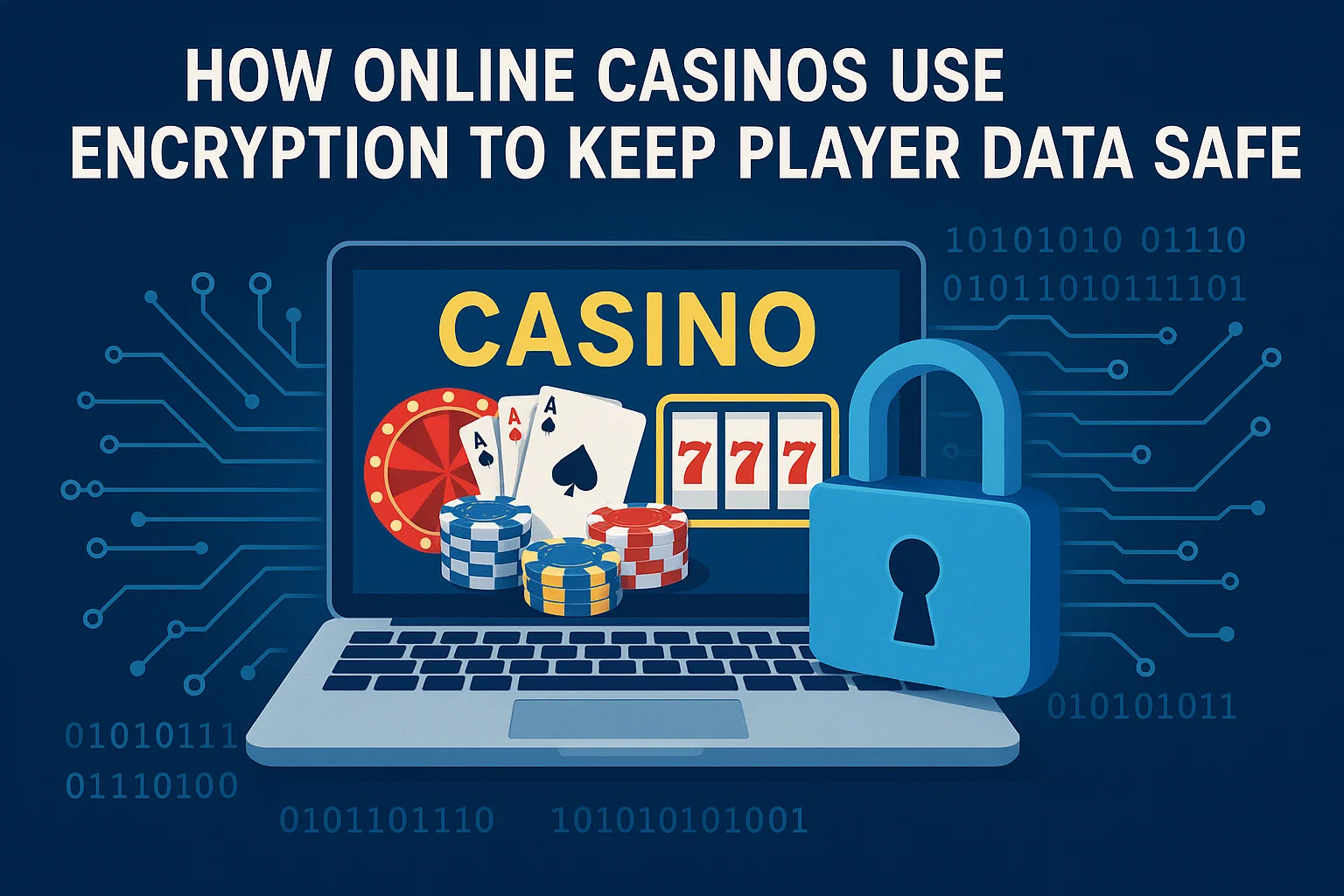How Online Casinos Use Encryption to Keep Player Data Safe

Strategic Framework: Encryption as Competitive Infrastructure
The global online gambling market’s trajectory toward USD 127.3 billion by 2027 has fundamentally transformed encryption from a technical implementation detail into a strategic business differentiator. Modern online casinos operate as data-intensive ecosystems requiring military-grade security protocols to protect financial transactions, personal identification data, and behavioral analytics across millions of daily interactions.
Industry analysis reveals that average data breach costs have reached $4.45 million with a 15% increase over three years, making robust encryption architecture not merely a compliance requirement but an economic necessity. The technical sophistication of contemporary threat actors has elevated encryption standards to enterprise-grade implementations comparable to banking and government security frameworks.
Core Encryption Technologies: Technical Architecture Analysis
SSL/TLS Protocol Implementation
Online casino encryption infrastructure centers on Secure Socket Layer (SSL) and Transport Layer Security (TLS) protocols, which establish encrypted communication channels between player devices and casino servers. Top casinos deploy SSL/TLS encryption using 128-bit or higher encryption standards, with industry leaders implementing 256-bit encryption equivalent to financial institution security levels.
Technical Specifications:
- SSL 3.0/TLS 1.3: Latest protocol versions offering enhanced security and performance optimization
- Perfect Forward Secrecy: Session-specific key generation preventing historical data compromise
- Certificate Authority Validation: Third-party verification ensuring encryption authenticity
- Cipher Suite Optimization: Algorithm selection balancing security strength with processing efficiency
Implementation Architecture:
- Real-time encryption/decryption during data transmission
- Automated certificate renewal maintaining continuous protection
- Multi-layered protocol stacking for redundant security coverage
- Performance optimization minimizing latency impact on gaming experience
Advanced Encryption Standard (AES) Integration
Modern online casinos implement AES encryption for comprehensive data protection, utilizing symmetric encryption algorithms providing exceptional security-to-performance ratios. AES-256 encryption with 256-bit keys is considered virtually unbreakable with current computing power, offering 2^256 possible key combinations requiring astronomical computational resources to compromise.
AES Implementation Strategies:
- Data-at-rest encryption protecting stored player information
- Database-level encryption safeguarding transaction histories
- File system encryption securing operational data
- Memory encryption protecting real-time processing information
Data Protection Scope: Comprehensive Security Framework
Financial Transaction Security
Online casino encryption protocols provide multi-layered protection for financial transactions, implementing end-to-end security throughout the payment processing lifecycle. Secure payment gateways provide end-to-end encryption of financial data during transactions, ensuring banking details remain protected from interception or unauthorized access.
Financial Data Protection Methods:
- Tokenization: Replacing sensitive card information with unique, non-sensitive tokens
- Point-to-Point Encryption (P2PE): Continuous encryption from input device to processing system
- Payment Card Industry (PCI) DSS Compliance: Adherence to industry-standard security requirements
- Multi-Factor Authentication: Additional verification layers for high-value transactions
Personal Information Safeguarding
Player privacy protection extends beyond financial data to encompass comprehensive personal information security. Identity verification documents, contact information, and behavioral data require sophisticated encryption protocols preventing identity theft and unauthorized profile access.
Personal Data Encryption Scope:
- Account credentials and authentication data
- Identity verification documents and biometric information
- Gaming preferences and behavioral analytics
- Communication records and customer service interactions
Regulatory Compliance Integration
International Data Protection Standards
Modern encryption implementations must satisfy multiple regulatory frameworks across different jurisdictions. Laws such as GDPR, UK Gambling Commission technical standards, and Malta Gaming Authority guidelines mandate strong encryption algorithms and thorough security audits.
Compliance Requirements:
- GDPR (General Data Protection Regulation): European Union privacy and data protection standards
- CCPA (California Consumer Privacy Act): United States privacy legislation requirements
- PIPEDA (Personal Information Protection): Canadian federal privacy law compliance
- Regional Gaming Authority Standards: Jurisdiction-specific technical requirements
Regulatory Implementation Challenges:
- Cross-border data transfer encryption requirements
- Audit trail generation for regulatory reporting
- Data retention policy enforcement through automated encryption lifecycle management
- Privacy impact assessment integration with encryption architecture
Quantum Computing Preparedness: Future-Proofing Strategies
Post-Quantum Cryptographic Development
The emergence of quantum computing technologies presents existential challenges to current encryption methodologies. Industry leaders are testing lattice-based and hash-based cryptography that remains secure against both classical and quantum computing threats, ensuring long-term data protection regardless of technological advancement.
Quantum-Resistant Technologies:
- Lattice-based cryptographic algorithms utilizing complex mathematical grid structures
- Hash-based signature schemes providing quantum-resistant authentication
- Code-based cryptography leveraging error-correcting code complexity
- Multivariate cryptographic systems based on polynomial equation solving difficulty
Implementation Timeline:
- Current quantum computers lacking cryptographically relevant capabilities
- Industry preparation for quantum threat emergence within 10-15 years
- Hybrid encryption systems combining classical and quantum-resistant methods
- Gradual migration strategies minimizing operational disruption
Advanced Security Integration: Holistic Protection Systems
Zero-Trust Architecture Implementation
Contemporary online casinos adopt zero-trust security frameworks requiring verification for every access request regardless of source location or user credentials. Zero-trust frameworks check all access demands from any origin point because security exists only after verification.
Zero-Trust Components:
- Continuous identity verification throughout gaming sessions
- Micro-segmentation limiting access to specific system components
- Endpoint device security monitoring and verification
- Behavioral analytics detecting anomalous access patterns
Artificial Intelligence Integration
Machine learning algorithms enhance encryption effectiveness through intelligent threat detection and automated response capabilities. AI-powered systems analyze transaction patterns, user behaviors, and system access attempts to identify potential security vulnerabilities requiring enhanced encryption protection.
AI-Enhanced Security Features:
- Predictive threat analysis identifying emerging attack vectors
- Automated encryption key management and rotation
- Behavioral biometrics for continuous user authentication
- Real-time anomaly detection triggering enhanced security protocols
Storage Encryption Methodologies
Database Security Architecture
Online casinos implement comprehensive database encryption protecting stored player information, financial records, and operational data. Database encryption involves specific columns or tables within databases being encrypted, adding additional protection layers to sensitive information repositories.
Database Encryption Strategies:
- Full Database Encryption: Comprehensive protection for entire database systems
- Field-Level Encryption: Selective protection for specific sensitive data columns
- Transparent Data Encryption (TDE): Automatic encryption/decryption during database operations
- Application-Level Encryption: Data protection implemented within application code
Full Disk Encryption (FDE) Implementation
Physical storage security utilizes Full Disk Encryption protecting data stored on servers, hard drives, and backup systems. FDE encrypts entire storage drives ensuring all data remains inaccessible without decryption keys, providing comprehensive protection against physical device compromise.
Performance Optimization: Security Without Compromise
Encryption Processing Efficiency
Modern online casinos balance robust security requirements with high-performance gaming experiences through optimized encryption implementations. Hardware Security Modules (HSMs) and specialized encryption processors enable real-time data protection without introducing perceptible latency.
Performance Enhancement Strategies:
- Dedicated encryption hardware reducing CPU overhead
- Optimized cipher suite selection balancing security and speed
- Encryption offloading to specialized network appliances
- Caching strategies for frequently accessed encrypted data
Scalability Architecture
Encryption systems must accommodate massive concurrent user loads while maintaining security integrity. Distributed encryption processing, load balancing, and horizontal scaling ensure consistent protection levels regardless of platform traffic volumes.
Industry Evolution: Strategic Technology Trends
Blockchain Integration Opportunities
Emerging blockchain technologies offer complementary encryption capabilities through decentralized security models. Blockchain systems ensure creation of tamper-proof transaction histories benefiting both gambling participants and platform managers, providing transparent audit trails while maintaining data privacy.
Blockchain Encryption Applications:
- Immutable transaction records with cryptographic verification
- Smart contract automation for transparent rule enforcement
- Decentralized identity management reducing central points of failure
- Provably fair gaming systems enabling independent verification
Biometric Authentication Evolution
Advanced biometric technologies integrate with encryption systems providing enhanced user authentication while simplifying user experience. Fingerprint scanning, facial recognition, and voice authentication create unique user identification methods complementing traditional encryption protocols.
Economic Impact Analysis: Security as Business Value
Cost-Benefit Assessment
Investment in advanced encryption infrastructure generates measurable returns through reduced breach risks, enhanced player confidence, and regulatory compliance cost reduction. Implementation of state-of-the-art encryption technologies requires significant infrastructure and expertise investment, but delivers substantial long-term value through risk mitigation.
Economic Considerations:
- Upfront technology investment versus long-term risk reduction
- Compliance cost avoidance through proactive security implementation
- Player retention benefits from enhanced security reputation
- Operational efficiency gains through automated security processes
Conclusion: Strategic Technology Leadership
Online casino encryption technologies represent sophisticated security ecosystems combining military-grade cryptographic protocols with performance-optimized implementations. The evolution from simple data protection to comprehensive security architecture demonstrates the industry’s commitment to player safety and regulatory compliance.
Strategic Implementation Priorities:
- Multi-Layered Encryption Architecture: Comprehensive protection spanning data transmission, storage, and processing
- Quantum-Resistant Preparedness: Proactive implementation of post-quantum cryptographic standards
- Regulatory Compliance Integration: Automated systems ensuring adherence to evolving international standards
- Performance-Security Balance: Optimal encryption implementation maintaining exceptional user experience
- Future Technology Integration: Blockchain, AI, and biometric technologies enhancing traditional encryption capabilities
The technical sophistication of modern online casino encryption demonstrates the industry’s evolution from basic data protection to enterprise-grade security infrastructure. As cyber threats continue advancing, successful operators will distinguish themselves through comprehensive encryption strategies that protect player data while enabling innovative gaming experiences.
The analytical framework reveals that encryption technology serves as both protective infrastructure and competitive advantage, making strategic security investment essential for long-term market positioning and player trust development.
This analysis reflects current encryption technologies and emerging security trends in online casino infrastructure as of 2025. Rapid technological advancement and evolving threat landscapes require continuous strategic assessment and security architecture adaptation.
